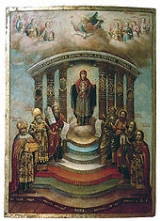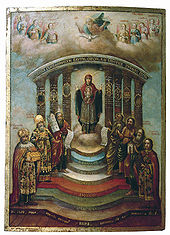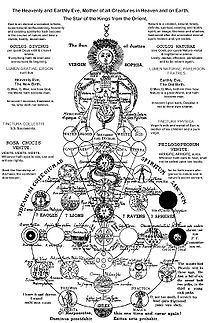
Sophiology
Encyclopedia

Bulgarian language
Bulgarian is an Indo-European language, a member of the Slavic linguistic group.Bulgarian, along with the closely related Macedonian language, demonstrates several linguistic characteristics that set it apart from all other Slavic languages such as the elimination of case declension, the...
and Russian
Russian language
Russian is a Slavic language used primarily in Russia, Belarus, Uzbekistan, Kazakhstan, Tajikistan and Kyrgyzstan. It is an unofficial but widely spoken language in Ukraine, Moldova, Latvia, Turkmenistan and Estonia and, to a lesser extent, the other countries that were once constituent republics...
: София) is a philosophical
Philosophy
Philosophy is the study of general and fundamental problems, such as those connected with existence, knowledge, values, reason, mind, and language. Philosophy is distinguished from other ways of addressing such problems by its critical, generally systematic approach and its reliance on rational...
concept regarding wisdom
Wisdom
Wisdom is a deep understanding and realization of people, things, events or situations, resulting in the ability to apply perceptions, judgements and actions in keeping with this understanding. It often requires control of one's emotional reactions so that universal principles, reason and...
, as well as a theological
Theology
Theology is the systematic and rational study of religion and its influences and of the nature of religious truths, or the learned profession acquired by completing specialized training in religious studies, usually at a university or school of divinity or seminary.-Definition:Augustine of Hippo...
concept regarding the wisdom of God
God
God is the English name given to a singular being in theistic and deistic religions who is either the sole deity in monotheism, or a single deity in polytheism....
. Sophiology has roots in Hellenistic
Hellenistic civilization
Hellenistic civilization represents the zenith of Greek influence in the ancient world from 323 BCE to about 146 BCE...
tradition, Platonism
Platonism
Platonism is the philosophy of Plato or the name of other philosophical systems considered closely derived from it. In a narrower sense the term might indicate the doctrine of Platonic realism...
, Orthodox Christianity
Eastern Orthodox Church
The Orthodox Church, officially called the Orthodox Catholic Church and commonly referred to as the Eastern Orthodox Church, is the second largest Christian denomination in the world, with an estimated 300 million adherents mainly in the countries of Belarus, Bulgaria, Cyprus, Georgia, Greece,...
, Gnosticism
Gnosticism
Gnosticism is a scholarly term for a set of religious beliefs and spiritual practices common to early Christianity, Hellenistic Judaism, Greco-Roman mystery religions, Zoroastrianism , and Neoplatonism.A common characteristic of some of these groups was the teaching that the realisation of Gnosis...
, Christian mysticism
Christian mysticism
Christian mysticism refers to the development of mystical practices and theory within Christianity. It has often been connected to mystical theology, especially in the Catholic and Eastern Orthodox traditions...
(Hildegard of Bingen
Hildegard of Bingen
Blessed Hildegard of Bingen , also known as Saint Hildegard, and Sibyl of the Rhine, was a German writer, composer, philosopher, Christian mystic, Benedictine abbess, visionary, and polymath. Elected a magistra by her fellow nuns in 1136, she founded the monasteries of Rupertsberg in 1150 and...
(1098–1179), Jakob Böhme
Jakob Böhme
Jakob Böhme was a German Christian mystic and theologian. He is considered an original thinker within the Lutheran tradition...
(1575–1624), Jane Leade
Jane Leade
Jane Ward Leade was a Christian mystic born in Norfolk, England. Her spiritual visions, recorded in a series of publications, were central in the founding and philosophy of the Philadelphian Society in London at the time.-Early life:...
(1624–1704), Vladimir Solovyov
Vladimir Solovyov (philosopher)
Vladimir Sergeyevich Solovyov was a Russian philosopher, poet, pamphleteer, literary critic, who played a significant role in the development of Russian philosophy and poetry at the end of the 19th century...
(1853-1900)), Esoteric Christianity
Esoteric Christianity
Esoteric Christianity is a term which refers to an ensemble of spiritual currents which regard Christianity as a mystery religion, and profess the existence and possession of certain esoteric doctrines or practices, hidden from the public but accessible only to a narrow circle of "enlightened",...
(Rosicrucianism), Wisdom Theology, New Age
New Age
The New Age movement is a Western spiritual movement that developed in the second half of the 20th century. Its central precepts have been described as "drawing on both Eastern and Western spiritual and metaphysical traditions and then infusing them with influences from self-help and motivational...
spirituality
Spirituality
Spirituality can refer to an ultimate or an alleged immaterial reality; an inner path enabling a person to discover the essence of his/her being; or the “deepest values and meanings by which people live.” Spiritual practices, including meditation, prayer and contemplation, are intended to develop...
, as well as contemporary feminism
Feminism
Feminism is a collection of movements aimed at defining, establishing, and defending equal political, economic, and social rights and equal opportunities for women. Its concepts overlap with those of women's rights...
, each of which has its own point of view. Some see Sophia as a deity in her own right, others see her as representing the Bride of Christ
Bride of Christ
The Bride of Christ or bride, the Lamb's wife is a term used in the New Testament of The Bible. Sometimes the Bride is implied through calling Jesus a Bridegroom. Sometimes the Church is compared to a bride betrothed to Christ. However there are instances where the interpretation of the usage of...
(Revelation 19), others as a feminine aspect of God representing wisdom (Proverbs 8 and 9), and others as a theological concept regarding the wisdom of God.
Eastern Orthodoxy
In the Eastern Orthodox Churches, Sophiology is considered equivalent to "Sophianism", which has been condemned as heretical by the Patriarch of Moscow: "The teaching of Professor and Archpriest S.N. Bulgakov -- which, by its peculiar and arbitrary (Sophian) interpretation, often distorts the dogmas of the Orthodox faith, which in some of its points directly repeats false teachings already condemned by conciliar decisions of the Church..." and other Orthodox hierarchs, who decided to "...recognize the teaching of Archpriest Sergei Bulgakov on Sophia the Wisdom of God as heretical". Personified representations of Holy Wisdom (Ἁγία Σοφία) or "Wisdom of God" among the Eastern Orthodox refer to the person of Jesus Christ, as illustrated in the Acts of the Seventh Ecumenical Council: "Our Lord Jesus Christ, our true God, the self-existent Wisdom of God the Father, Who manifested Himself in the flesh, and by His great and divine dispensation (lit., economy) freed us from the snares of idolatry, clothing Himself in our nature, restored it through the cooperation of the Spirit, Who shares His mind..." More recently, it has been stated that "From the most ancient times and onwards many Orthodox countries have been consecrating churches to the Lord Jesus Christ as the Wisdom of God". Orthodox IconIcon
An icon is a religious work of art, most commonly a painting, from Eastern Christianity and in certain Eastern Catholic churches...
s or Cathedral
Cathedral
A cathedral is a Christian church that contains the seat of a bishop...
s exist with names often translated as "Saint Sophia" do exist. However, they do not refer to a specific individual, human or divine, named "Sophia". Rather, they are a mistranslation of Ἁγία Σοφία, or "Holy Wisdom", which is a convention used in the Orthodox Church to refer to Christ.
See also

- ChokhmahChokhmahChokhmah, also sometimes transliterated chochma or hokhmah is the Hebrew word for "wisdom". It is cognate with the Arabic word Hikmah, which also means 'wisdom'. The word "chokhmah" and others derived from it may connote one of several things.-People:A "wise man" is a chakham...
- Christian mysticismChristian mysticismChristian mysticism refers to the development of mystical practices and theory within Christianity. It has often been connected to mystical theology, especially in the Catholic and Eastern Orthodox traditions...
- Esoteric ChristianityEsoteric ChristianityEsoteric Christianity is a term which refers to an ensemble of spiritual currents which regard Christianity as a mystery religion, and profess the existence and possession of certain esoteric doctrines or practices, hidden from the public but accessible only to a narrow circle of "enlightened",...
- Gnostic Christianity
- GnosticismGnosticismGnosticism is a scholarly term for a set of religious beliefs and spiritual practices common to early Christianity, Hellenistic Judaism, Greco-Roman mystery religions, Zoroastrianism , and Neoplatonism.A common characteristic of some of these groups was the teaching that the realisation of Gnosis...
- Hagia SophiaHagia SophiaHagia Sophia is a former Orthodox patriarchal basilica, later a mosque, and now a museum in Istanbul, Turkey...
- Heavenly Mother (Latter Day Saints)
- Holy Wisdom
- PhronesisPhronesisPhronēsis is an Ancient Greek word for wisdom or intelligence which is a common topic of discussion in philosophy. In Aristotelian Ethics, for example in the Nicomachean Ethics it is distinguished from other words for wisdom as the virtue of practical thought, and is usually translated "practical...
- Pistis SophiaPistis SophiaPistis Sophia is an important Gnostic text, possibly written as early as the 2nd century. The five remaining copies, which scholars place in the 5th or 6th centuries, relate the Gnostic teachings of the transfigured Jesus to the assembled disciples , when the risen Christ had accomplished eleven...
- Sophia
- Sophia of Jesus ChristThe Sophia of Jesus ChristThe Sophia of Jesus Christ is one of many Gnostic tractates from the Nag Hammadi codices, discovered in Egypt in 1945. The title is somewhat coded, since although Sophia is Greek for wisdom, in a gnostic context, Sophia is the syzygy of Christ....
- SophismSophismSophism in the modern definition is a specious argument used for deceiving someone. In ancient Greece, sophists were a category of teachers who specialized in using the tools of philosophy and rhetoric for the purpose of teaching aretê — excellence, or virtue — predominantly to young statesmen and...
- The Order of Christ SophiaThe Order of Christ SophiaThe Order of Christ Sophia is a Christian organization that was founded in 1999. The OCS describes itself as a holy order and spiritual school that offers training in the doctrines of Christian mysticism...
- TheosophyTheosophy (history of philosophy)Theosophy , designates several bodies of ideas since Late Antiquity. The Greek term is attested on magical papyri .-Neoplatonism:...
People
- Jane LeadeJane LeadeJane Ward Leade was a Christian mystic born in Norfolk, England. Her spiritual visions, recorded in a series of publications, were central in the founding and philosophy of the Philadelphian Society in London at the time.-Early life:...
- Pavel FlorenskyPavel FlorenskyPavel Alexandrovich Florensky was a Russian Orthodox theologian, philosopher, mathematician, electrical engineer, inventor and Neomartyr sometimes compared by his followers to Leonardo da Vinci.-Early life:Pavel Aleksandrovich Florensky was born on January 21, 1882, into the family of a railroad...
- Theophilus of AntiochTheophilus of AntiochTheophilus, Patriarch of Antioch, succeeded Eros c. 169, and was succeeded by Maximus I c.183, according to Henry Fynes Clinton, but these dates are only approximations...
- ValentinusValentinus (Gnostic)Valentinus was the best known and for a time most successful early Christian gnostic theologian. He founded his school in Rome...
- Vladimir SolovyovVladimir Solovyov (philosopher)Vladimir Sergeyevich Solovyov was a Russian philosopher, poet, pamphleteer, literary critic, who played a significant role in the development of Russian philosophy and poetry at the end of the 19th century...
Icons and images of Sophia (Holy Wisdom)
- An Icon depicting Christ as Holy Wisdom and an explanation, on the website of the Orthodox Church in America
- An Orthodox Icon of Christ the Holy Wisdom of God
- A Russian Orthodox Icon depicting Christ as the Holy Wisdom of God
- Another Russian Orthodox Icon of Christ the Holy Wisdom of God
- Another Eastern Orthodox Icon representing Christ as Holy Wisdom
- An Web-site showing some Orthodox Icons depicting Christ as Holy Wisdom
- Another Russian Orthodox Icon depicting Christ as Holy Wisdom
- Icon of Sophia, the Wisdom of God - A good brief overview of the Sophia icon
- Icon of Divine Sophia by Eileen McGuckin, The Icon Studio, New York
- Divine Sophia Another Version of the Icon of Holy Wisdom by Eileen McGuckin
- Holy Wisdom (early 18th century)
- Another icon of Sophia
- Sophiology Forums
Film
- Hartley Film Foundation, Sophia: Secret Wisdom - By John McGuckin and others
Essays related to Sophia or Sophiology
- Lilianna Kiejzik on the emergence of the study of Sophia (Sophiology) in Russian philosophy - in Polish
- Gregorios Wassen, Introduction to Sophiology
- Gregorios Wassen, The Divine Sophia in the Holy Trinity
- Gregorios Wassen, Sophia in Fr. Sergius Bulgakov's Theological Thought
- Jonathan Seiling, Kant's Third Antinomy and Spinoza's Substance in the Sophiology of Florenskii and Bulgakov - Presented at Florensky conference in Moscow, September 2005
- Joseph H. J. Leach, Parallel Visions - A consideration of the work of Pavel Florensky and Pierre Teilhard de Chardin - Contains a section on Sophia
- Cambridge Institute for Orthodox Christian Studies, The Figure of Wisdom in the Patristic Tradition
- Discussion thread at Monachos.net: Sophia in the patristic tradition La Sofia Come Quarta Ipostasi Tra Dio e Il Mondo - By Rosanna Gambino
In other traditions
- Sophia: Goddess of Wisdom & God's Bride
- Virgin Sophia - Rosicrucian Library
- Dark Mirrors of Heaven: Gnostic Cosmogony
Bibliographic
- Bibliography - From Mikhail Sergeev, Sophiology in Russian Orthodoxy: Solov’ev, Bulgakov, Losskii and Berdiaev. Lewiston, Maine: The Edwin Mellen Press, 2006
- Divine Wisdom articles compiled by Priscilla Hunt

